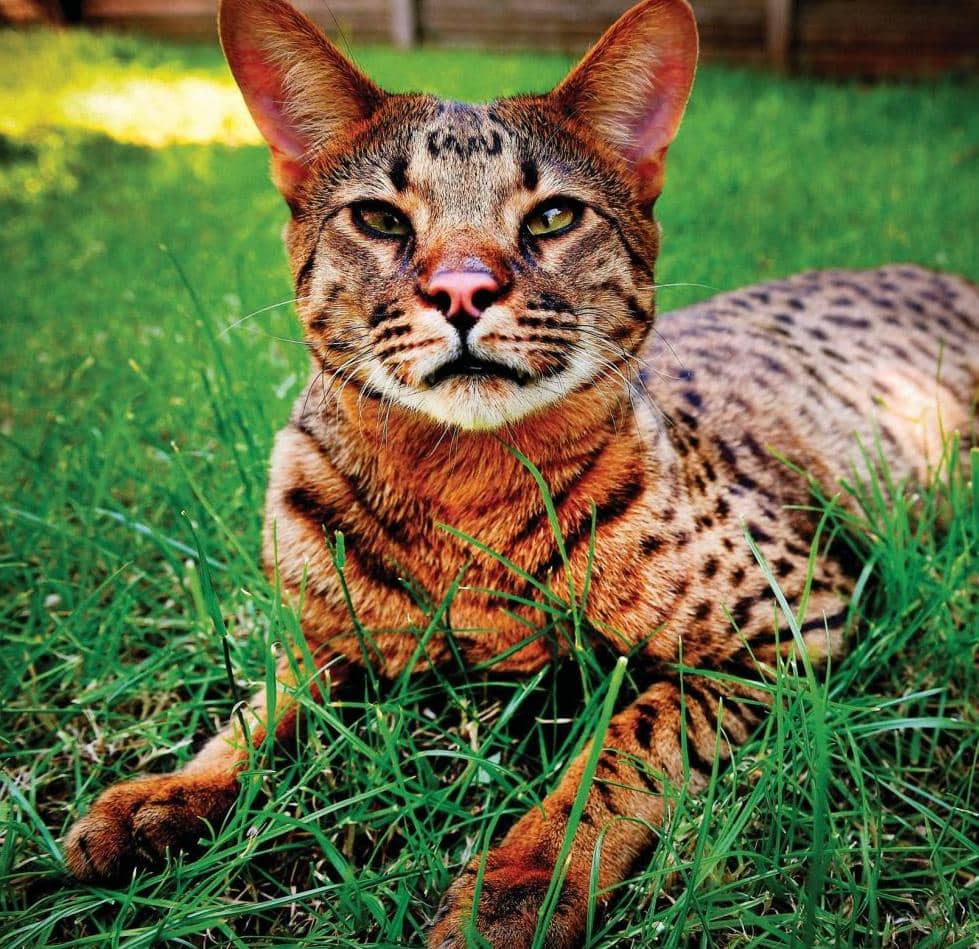The trouble with trophy cats
BBC Wildlife
|June 2022
Semi-wild savannah cats are increasing in popularity in the UK. But do they make sensible pets?

IMAGINE FOR A MOMENT THAT THE UK was breeding wild wolves with poodles and selling their hybrid puppies on the internet. Sound a bit 'off' for a nation of animal-lovers aspiring to be world leaders in animal welfare? Yet here we are in the 21st century with a growing legal trade in breeding exotic wild cats with domestics to create 'trophy' pets.
Savannah cats are a cross between a serval (a wild felid found in Africa) and a domestic cat. They sell for vast sums of money, but owning such an animal comes with a host of challenges that can result in harm to children, native wildlife, and to the cats themselves.
The story of the savannah cat started back in 1986, in Pennsylvania, USA, when a male serval bred with a domestic Siamese. Bengals and chausies, the equivalent hybrids of leopard and jungle cats respectively, were already on the scene by this time (see box on p61). However, it wasn't until 2001 that The International Cat Association formally adopted the savannah breed, enabling it to be exhibited at shows and to compete against domestic breeds. This sparked a surge in the keeping and breeding of these animals, which now fetch upto £20,000 for a first generation (F1) kitten. The 'F' (filial) number indicates how many generations an individual is from its original serval parent.

FOR ANYONE NOT FAMILIAR WITH F servals, they are undeniably exquisite felines. Lean and long in the leg, they sport a composite, honey-coloured coat of black spots morphing into stripes that lead up to their crowning glory - a pair of fennec-fox-like ears.
Dit verhaal komt uit de June 2022-editie van BBC Wildlife.
Abonneer u op Magzter GOLD voor toegang tot duizenden zorgvuldig samengestelde premiumverhalen en meer dan 9000 tijdschriften en kranten.
Bent u al abonnee? Aanmelden
MEER VERHALEN VAN BBC Wildlife

BBC Wildlife
"I was terrified the elephant would ram us"
African elephant in Kenya
2 mins
January 2026

BBC Wildlife
ALL YOU EVER NEEDED TO KNOW ABOUT THE Fennec fox
THE FENNEC FOX IS THE SMALLEST fox in the world, with a body length that can be as little as 24cm.
3 mins
January 2026

BBC Wildlife
INTO THE PLASTISPHERE
A unique synthetic ecosystem is evolving in our oceans – welcome to the plastisphere
7 mins
January 2026

BBC Wildlife
“More than half of all animal life exists in a parasitic relationship, and all life lives in symbiosis”
Our survival depends on species evolving to live together - but some relationships take dark turns
7 mins
January 2026

BBC Wildlife
Are animals able to dream?
SLEEP IS A MYSTERIOUS THING. FOR A long time, we weren't sure why we do it.
1 mins
January 2026

BBC Wildlife
Does a cuckoo know it's a cuckoo?
ABSURD LITTLE BIRDS ACROSS THE world lay their eggs in the nests of other species, leaving the hapless parents to raise a changeling at the expense of their own offspring.
2 mins
January 2026

BBC Wildlife
Orcas killing young sharks
Juvenile great whites are easy prey for orca pod
1 mins
January 2026

BBC Wildlife
Ocean goes on tour
Acclaimed film touring the UK, backed by live orchestra and choir
1 min
January 2026

BBC Wildlife
Feisty bats hunt like lions
Winged mammals use a 'hang and wait' strategy to take down large prey
1 mins
January 2026

BBC Wildlife
SNAP-CHAT
Richard Birchett on magical merlins, wily coyotes and charging deer
2 mins
January 2026
Translate
Change font size

